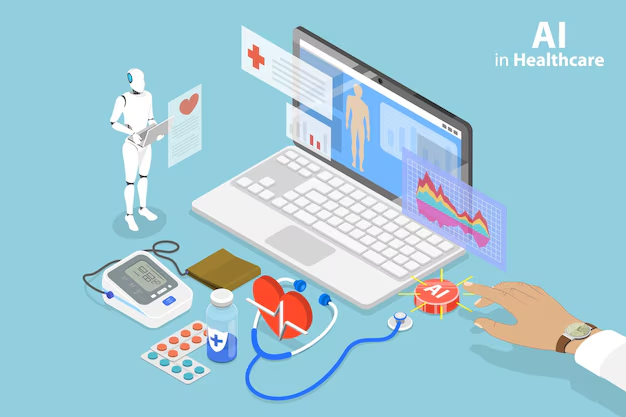Artificial Intelligence (AI) is revolutionising industries across the globe, but its impact on healthcare is truly transformative. From predicting diseases before symptoms appear to assisting in surgeries, AI is enhancing efficiency, accuracy, and patient outcomes. With the healthcare industry generating massive amounts of data every day, AI tools and algorithms are enabling professionals to make faster, more informed decisions while reducing operational costs. This blog explores how AI is reshaping healthcare, the most promising use cases, real-world examples, challenges, and how to integrate AI effectively in medical operations.
1. What is Artificial Intelligence in Healthcare?
Artificial Intelligence in healthcare refers to the use of complex algorithms, machine learning models, and advanced computing systems to mimic human intelligence for solving medical challenges. AI applications in healthcare include disease diagnosis, drug development, patient monitoring, and hospital management. By analysing medical images, electronic health records (EHRs), genetic data, and clinical trial results, AI delivers data-driven insights that can:
- Predict health risks
- Assist in treatment planning
- Monitor patient recovery
- Automate administrative tasks
2. Benefits of AI in Healthcare Operations
AI is not just a futuristic technology; it’s already delivering measurable benefits in hospitals, clinics, and research facilities worldwide.
2.1 Faster and More Accurate Diagnosis
AI algorithms can process medical images and test results in seconds, detecting conditions like cancer, stroke, or heart disease earlier than traditional methods.
2.2 Personalised Treatment Plans
Machine learning models can analyse patient history, genetics, and lifestyle to recommend tailored treatment plans, improving recovery rates.
2.3 Operational Efficiency
AI-powered scheduling systems reduce patient waiting times, optimise staff allocation, and manage hospital resources more effectively.
2.4 Enhanced Patient Engagement
Virtual assistants, AI chatbots, and mobile health apps enable patients to access medical information, book appointments, and receive reminders from anywhere.
2.5 Cost Reduction
By automating routine administrative work and improving diagnosis accuracy, AI helps reduce unnecessary treatments, tests, and hospital stays.
3. How to Use AI in Healthcare: Top Use Cases
Here are the most impactful ways AI is being applied in healthcare, along with real-world examples.
3.1 Medical Imaging and Diagnostics
AI-powered imaging tools can detect tumours, fractures, and infections faster and more accurately than human radiologists.
Example: Google’s DeepMind AI achieved over 90% accuracy in detecting breast cancer from mammograms.
3.2 Predictive Analytics for Disease Prevention
AI systems analyse patient records, lifestyle patterns, and genetic data to predict diseases before they occur.
Example: AI models help predict diabetes and heart disease risks years in advance.
3.3 Drug Discovery and Development
AI accelerates drug research by simulating molecular structures and predicting their effectiveness.
Example: AI was used to identify potential COVID-19 treatments within months instead of years.
3.4 Robotic Surgery Assistance
AI-guided robots assist surgeons in performing precise, minimally invasive procedures, reducing recovery times.
Example: The da Vinci Surgical System uses AI to enhance surgical precision.
3.5 Remote Patient Monitoring
Wearable devices powered by AI monitor vital signs in real time and alert doctors if abnormal patterns are detected.
Example: Smartwatches detecting irregular heart rhythms and notifying healthcare providers.
3.6 Virtual Health Assistants
AI chatbots provide instant medical advice, medication reminders, and post-surgery care instructions.
Example: Babylon Health’s AI assistant answers patient queries and suggests next steps.
3.7 Administrative Workflow Automation
AI tools manage billing, claims processing, and patient records with greater speed and accuracy.
Transform your healthcare with AI!
Partner with Equitysoft Technologies for custom AI solutions that enhance patient care and efficiency.
4. Challenges and Considerations in Implementing AI in Healthcare
While AI offers incredible opportunities, there are several challenges that must be addressed.
4.1 Data Privacy and Security
Medical data is highly sensitive. AI systems must comply with data protection regulations like GDPR to ensure patient privacy.
4.2 Integration with Existing Systems
AI tools need to integrate seamlessly with hospital IT systems, EHRs, and existing workflows.
4.3 Bias in AI Models
AI can produce biased results if trained on incomplete or skewed datasets, leading to inaccurate diagnoses.
4.4 High Implementation Costs
Developing and deploying AI systems can be expensive for smaller healthcare facilities.
4.5 Training and Adaptation
Medical staff need proper training to effectively use AI-powered tools in clinical settings.
Let’s Make Healthcare Smarter Together
From faster diagnoses to better patient care discover how AI can truly make a difference.
5. Real-World Examples of AI in Healthcare
- PathAI: Detects cancer in pathology slides with high accuracy.
- Tempus: Uses AI to analyse clinical and molecular data for personalised cancer care.
- Butterfly Network: AI-powered handheld ultrasound device for point-of-care diagnostics.
- Enlitic: Enhances radiology workflows by identifying patterns in X-rays and CT scans.
6. How to Successfully Implement AI in Healthcare
To integrate AI effectively, healthcare providers should:
- Identify the most critical problems AI can solve.
- Ensure access to clean, high-quality data.
- Choose AI tools with proven clinical validation.
- Start with pilot projects before scaling.
- Continuously monitor and update AI systems.
7. Why Choose Equitysoft Technologies for AI in Healthcare?
At Equitysoft Technologies, we specialise in developing custom AI healthcare solutions that improve patient outcomes and streamline operations. Our expertise includes:
- AI-powered medical imaging tools
- Predictive analytics platforms
- Healthcare chatbots and virtual assistants
- Integration with hospital systems and EHRs
- End-to-end AI software development
We focus on data security, scalability, and compliance with healthcare regulations, ensuring our clients get reliable, future-ready solutions.
Final Thoughts
AI in healthcare is no longer a distant dream it’s here and transforming how medical services are delivered. From early disease detection to personalised treatment and operational automation, AI is reshaping healthcare for the better. By adopting AI strategically, healthcare providers can deliver faster, safer, and more efficient care.
If you are ready to bring AI innovation into your healthcare operations, Equitysoft Technologies can guide you through the entire process, from concept to deployment.
FAQs on AI in Healthcare
Everything You Need to Know About AI in Hospitals & Medical Practice







